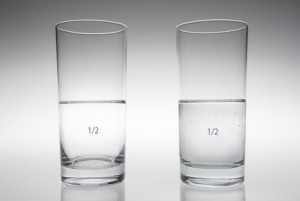Proof of God via Business Consultant
In my discussion with atheists, the
atheist always wants to see proof of God’s existence. If I cannot
provide scientific data, then he makes the claim that I believe in a
fairy tale or that I am delusional. I think G.K. Chesterton is right, I
do believe in fairy tales because I believe in dragons and the fairy
tales told me that dragons can be defeated. I have been called crazy
many times, but I also know that many patients in the asylum think the
nurses are crazy too. My response to the atheist is that God cannot be
measured by science because science is the wrong instrument. There are
many different instruments of measurement like reason, logic, common
sense, and theology. Theology is the instrument used to study God.
Let me give an example I read from Peter Drucker, one of America’s most influential management consultants. He wrote many books that have shaped the minds of many in management and innovation. I am reading Innovation and Entrepreneurship and found an intriguing and simple explanation that sums up my “wrong instrument” reply to atheists.
He wrote a chapter regarding opportunity and its effect on a business. He gives many examples that a simple change in perception has had on an economy. He starts his chapter with this quote, “In mathematics there is no difference between ‘The glass is half full’ and ‘The glass is half empty.’ But the meaning of these two statements is totally different, and so are their consequences.”
The short chapter introduction sent my mind whirling because it shows the difference in using the right instrument to measure different realities. Science can tell me that the half-full and half-empty glasses are identical because they each have the same amount of stuff. But if I use a different tool in my intellectual toolbox, I realize that the wisdom of this example means something more than just a quantity. It deals with how a person understands or is a lens through which he sees his life. The person that sees life as half-full interprets life in a different way than the half-empty person.
- See more at: http://www.ignitumtoday.com/2013/11/19/proof-of-god-via-business-consultant/#sthash.02ZvkKPF.dpufLet me give an example I read from Peter Drucker, one of America’s most influential management consultants. He wrote many books that have shaped the minds of many in management and innovation. I am reading Innovation and Entrepreneurship and found an intriguing and simple explanation that sums up my “wrong instrument” reply to atheists.
He wrote a chapter regarding opportunity and its effect on a business. He gives many examples that a simple change in perception has had on an economy. He starts his chapter with this quote, “In mathematics there is no difference between ‘The glass is half full’ and ‘The glass is half empty.’ But the meaning of these two statements is totally different, and so are their consequences.”
The short chapter introduction sent my mind whirling because it shows the difference in using the right instrument to measure different realities. Science can tell me that the half-full and half-empty glasses are identical because they each have the same amount of stuff. But if I use a different tool in my intellectual toolbox, I realize that the wisdom of this example means something more than just a quantity. It deals with how a person understands or is a lens through which he sees his life. The person that sees life as half-full interprets life in a different way than the half-empty person.
November 2013 | J.Q. Tomanek
In my
discussion with atheists, the atheist always wants to see proof of God’s
existence. If I cannot provide scientific data, then he makes the claim that I
believe in a fairy tale or that I am delusional. I think G.K. Chesterton is
right, I do believe in fairy tales because I believe in dragons and the fairy
tales told me that dragons can be defeated. I have been called crazy many
times, but I also know that many patients in the asylum think the nurses are
crazy too. My response to the atheist is that God cannot be measured by science
because science is the wrong instrument. There are many different instruments
of measurement like reason, logic, common sense, and theology. Theology
is the instrument used to study God.
Let me give
an example I read from Peter Drucker, one of America’s most influential
management consultants. He wrote many books that have shaped the minds of many
in management and innovation. I am reading Innovation and Entrepreneurship and
found an intriguing and simple explanation that sums up my “wrong instrument”
reply to atheists.
He wrote a
chapter regarding opportunity and its effect on a business. He gives many
examples that a simple change in perception has had on an economy. He starts
his chapter with this quote, “In mathematics there is no difference between
‘The glass is half full’ and ‘The glass is half empty.’ But the meaning of
these two statements is totally different, and so are their consequences.”
The short
chapter introduction sent my mind whirling because it shows the difference in
using the right instrument to measure different realities. Science can tell me
that the half-full and half-empty glasses are identical because they each have
the same amount of stuff. But if I use a different tool in my intellectual
toolbox, I realize that the wisdom of this example means something more than
just a quantity. It deals with how a person understands or is a lens through
which he sees his life. The person that sees life as half-full interprets life
in a different way than the half-empty person.
- See more
at:
http://www.ignitumtoday.com/2013/11/19/proof-of-god-via-business-consultant/#sthash.02ZvkKPF.dpuf
